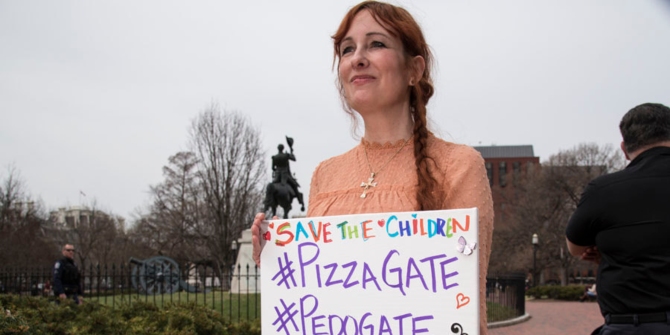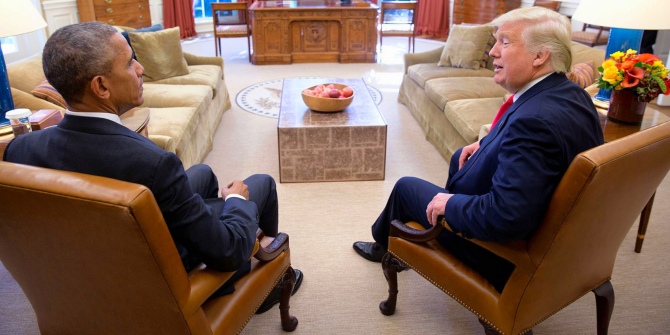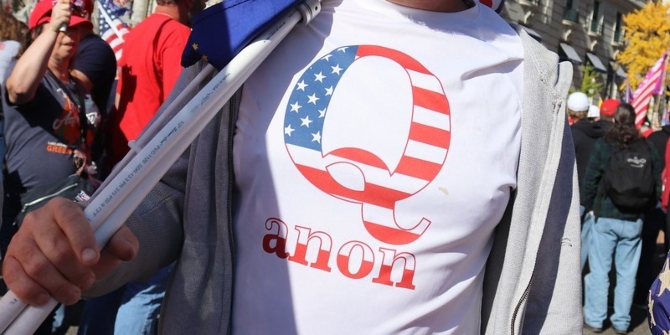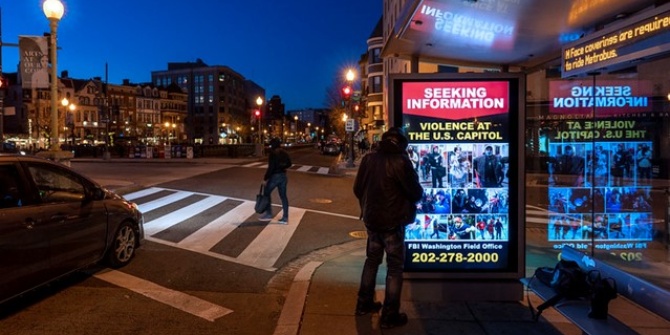
 The last two years have witnessed an explosion of headlines and concern over the apparent growth of ‘QAnon’, a far-right conspiracy group that believes President Trump is battling against ‘deep state’ child sex traffickers. Using national survey data, Joseph E. Uscinski and Adam M. Enders find that, far from having widespread support, most Americans view the QAnon movement unfavorably, and that they also wildly overestimate the true extent of child sex trafficking.
The last two years have witnessed an explosion of headlines and concern over the apparent growth of ‘QAnon’, a far-right conspiracy group that believes President Trump is battling against ‘deep state’ child sex traffickers. Using national survey data, Joseph E. Uscinski and Adam M. Enders find that, far from having widespread support, most Americans view the QAnon movement unfavorably, and that they also wildly overestimate the true extent of child sex trafficking.
In light of their deranged beliefs and visible role in the Capitol riot, the QAnon group has become a focus in debates about the role and consequences of online misinformation and extremism. For those not following the fringes, QAnon is an online, decentralized conspiracy theory group that believes they are receiving coded messages from a government insider about former President Trump’s battle against deep state child sex traffickers.
Headlines frequently warn that the QAnon movement is large and only increasing in size. Commentators have argued that QAnon has taken over the GOP, rising to the same political level as the insurgent Tea Party did in 2010 (the current US Congress has two Republican Party members who have expressed sympathy with QAnon in the past, Representative Lauren Boebert of Colorado and Representative Marjorie Taylor Greene of Georgia). New stories are written nearly every day about social media users falling down the QAnon rabbit hole and families being torn apart by QAnon beliefs. QAnon is even reported to be expanding outside of the United States, with new enclaves in Europe and Australia. Some headlines suggest that 1 in 4 Britons believe in QAnon! All this is to say that one could be excused for thinking people everywhere are losing their ability to reason properly.
Despite the disconcerting content of QAnon beliefs, our polling––which extends back to 2018––tells a very different story than the headlines. We find that support for QAnon is quite low and stable over time. At the same time, wild-eyed beliefs about child trafficking and the involvement of government and Hollywood elites in it appear to be quite prevalent among Americans, making it easy to confuse large portions of the public for a narrower group of Q followers.
Most reports have overestimated the size of the QAnon movement
In 2018, QAnon became the subject of numerous headlines when a few supporters were spotted in Q regalia at a Trump rally in Tampa, FL. Concerned that the group was gaining strength at the time, we asked a representative sample of Floridians to rate the QAnon Movement on a scale of 0–100, with 100 signaling strong favorability. It was rated 22, on average, finding only slightly more support than Fidel Castro. Coming from Floridians, this is no endorsement.
We have continued to ask Americans to rate the QAnon Movement since then, finding no evidence that it is gaining support or becoming mainstream. In a national survey in October 2020, the QAnon movement was rated 16, on average––on par with other extremist groups we asked about, such as White Nationalists. We also asked our survey respondents whether they agreed or disagreed with the statement, “I believe in QAnon.” Only 6.8 percent agreed or strongly agreed. This is in line with other surveys that use similar question wording. For comparison, the Tea Party, in its heyday, was supported by about 30 percent of Americans.
Altogether, support for QAnon in the US appears to be weak, and stably so over time. Of course, weak support might still be alarming given the disturbing content of QAnon beliefs. For perspective, however, QAnon is less popular than most conspiracy theories that we poll about––and on par with fringe ideas about lizard people!
Most people overestimate the scope of child trafficking
One of the core tenets of the QAnon movement is the belief that elites in government and Hollywood are engaged in a massive child trafficking racket. Outlandish as this may seem, many people are rightly concerned about child sex trafficking but vastly overestimate its prevalence. Thus, many reports overestimate support for QAnon by conflating it with beliefs that existed before its rise, or that run parallel to it.
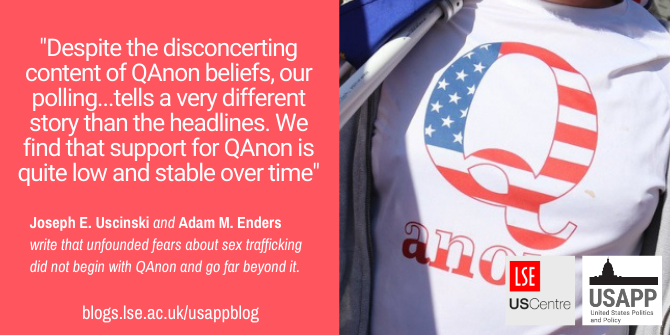
“IMG_4606a” by Elvert Barnes is licensed under CC BY SA 2.0
We asked our survey respondents if they believed the number of children being trafficked in the US was above, about, or below 300,000 children. We framed the question this way because several politicians have used this number in the past, even though it has been labeled with “four Pinocchios” by fact checkers who consider it a gross overestimation. Our survey found that 50 percent of Americans think the real number of trafficked children is about 300,000 or higher. Thirty-four percent think it is “much higher.”
Adjacently, we asked respondents about the existence of elite Hollywood and government sex trafficking rings. Thirty-five percent agreed that “elites, from government and Hollywood, are engaged in a massive child sex trafficking racket.” Simply put, ideas frequently taken as indicative of deep-seated QAnon support exist well beyond the small number of people who claim to believe in QAnon, and long predate QAnon.
Sex trafficking beliefs are the product of elite fear-based messaging
We suspect that a deluge of misleading information from politicians, the media, and academics all play a role in creating a moral panic about child trafficking. Given the history of related panics, including those about ritual sex abuse long prior to QAnon, overestimations of the scope of child trafficking are likely a constant waiting for any actor––be it a strategic politician or shadowy internet character–– to activate them.
Baltimore Mayor Jack Young, for example, recently claimed that, “We’re getting reports of somebody in a white van trying to snatch up young girls for human trafficking and for selling body parts.” The Mayor had not received this information from a credible source, but the message served its purpose: to showcase that he’s doing his job to keep our children safe. Everyone wants to stop trafficking; thus, tough on human trafficking rhetoric makes a great cudgel with which politicians can unify their base or bludgeon opponents.
To be clear, human trafficking is repugnant and there is no acceptable level of such an activity. But overestimating its prevalence does nothing to help victims.
Likewise, misunderstanding the size and scope of QAnon support is more than a benign misstep. Popular claims about the characteristics of QAnon believers have been used as fodder for increasing hostility between those on different sides of the political aisle following a highly contentious election cycle. Misplaced fears about the growing breadth of the QAnon movement have amplified calls for content moderation, censorship, and even the nationalization of social media.
These calls haven’t fallen on deaf ears––most major social media platforms have recently taken some action against QAnon, including the removal of content. But, too many reports confuse people who overestimate the prevalence of sex trafficking and the role of elites in it with support for QAnon. Coverage that simultaneously pathologizes Q believers and overestimates their ranks only serves to stunt critical investigations into the evolution and implications of QAnon and other dubious beliefs.
Please read our comments policy before commenting.
Note: This article gives the views of the author, and not the position of USAPP– American Politics and Policy, nor of the London School of Economics.
Shortened URL for this post: https://bit.ly/3qx9keU
About the authors
 Joseph E. Uscinski – University of Miami
Joseph E. Uscinski – University of Miami
Joseph E. Uscinski is associate professor of political science at University of Miami.
 Adam M. Enders – University of Louisville
Adam M. Enders – University of Louisville
Adam M. Enders is assistant professor of political science at University of Louisville.


